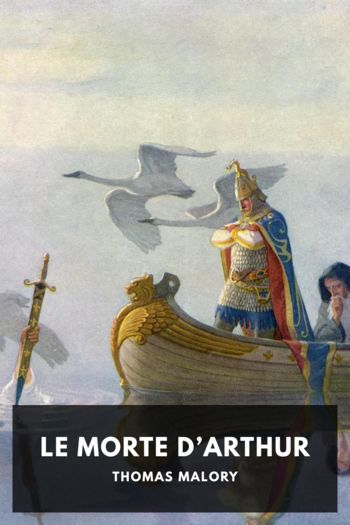Le Morte d’Arthur, Thomas Malory [most popular ebook readers TXT] 📗

- Author: Thomas Malory
Book online «Le Morte d’Arthur, Thomas Malory [most popular ebook readers TXT] 📗». Author Thomas Malory
And there upon a day Sir Tristram met with two brethren that were knights with King Mark, and there he struck off the head of the one, and wounded the other to the death; and he made him to bear his brother’s head in his helm unto the king, and thirty more there he wounded. And when that knight came before the king to say his message, he there died afore the king and the queen. Then King Mark called his council unto him, and asked advice of his barons what was best to do with Sir Tristram. Sir, said the barons, in especial Sir Dinas, the Seneschal, Sir, we will give you counsel for to send for Sir Tristram, for we will that ye wit many men will hold with Sir Tristram an he were hard bestead. And sir, said Sir Dinas, ye shall understand that Sir Tristram is called peerless and makeless of any Christian knight, and of his might and hardiness we knew none so good a knight, but if it be Sir Launcelot du Lake. And if he depart from your court and go to King Arthur’s court, wit ye well he will get him such friends there that he will not set by your malice. And therefore, sir, I counsel you to take him to your grace. I will well, said the king, that he be sent for, that we may be friends. Then the barons sent for Sir Tristram under a safe conduct. And so when Sir Tristram came to the king he was welcome, and no rehearsal was made, and there was game and play. And then the king and the queen went a-hunting, and Sir Tristram.
XXXIIIHow Sir Lamorak jousted with thirty knights, and Sir Tristram at the request of King Mark smote his horse down.
The king and the queen made their pavilions and their tents in that forest beside a river, and there was daily hunting and jousting, for there were ever thirty knights ready to joust unto all them that came in at that time. And there by fortune came Sir Lamorak de Galis and Sir Driant; and there Sir Driant jousted right well, but at the last he had a fall. Then Sir Lamorak proffered to joust. And when he began he fared so with the thirty knights that there was not one of them but that he gave him a fall, and some of them were sore hurt. I marvel, said King Mark, what knight he is that doth such deeds of arms. Sir, said Sir Tristram, I know him well for a noble knight as few now be living, and his name is Sir Lamorak de Galis. It were great shame, said the king, that he should go thus away, unless that some of you meet with him better. Sir, said Sir Tristram, meseemeth it were no worship for a noble man to have ado with him: and for because at this time he hath done over much for any mean knight living, therefore, as meseemeth, it were great shame and villainy to tempt him any more at this time, insomuch as he and his horse are weary both; for the deeds of arms that he hath done this day, an they be well considered, it were enough for Sir Launcelot du Lake. As for that, said King Mark, I require you, as ye love me and my lady the queen, La Beale Isoud, take your arms and joust with Sir Lamorak de Galis. Sir, said Sir Tristram, ye bid me do a thing that is against knighthood, and well I can deem that I shall give him a fall, for it is no mastery, for my horse and I be fresh both, and so is not his horse and he; and wit ye well that he will take it for great unkindness, for ever one good knight is loath to take another at disadvantage; but because I will not displease you, as ye require me so will I do, and obey your commandment.
And so Sir Tristram armed him and took his horse, and put him forth, and there Sir Lamorak met him mightily, and what with the might of his own spear, and of Sir Tristram’s spear, Sir Lamorak’s horse fell to the earth, and he sitting in the saddle. Then anon as lightly as he might he avoided the saddle and his horse, and put his shield afore him and drew his sword. And then he bade Sir Tristram: Alight, thou knight, an thou durst. Nay, said Sir Tristram, I will no more have ado with thee, for I have done to thee over much unto my dishonour and to thy worship. As for that, said Sir Lamorak, I can thee no thank; since thou hast for-jousted me on horseback I require thee and I beseech thee, an thou be Sir Tristram, fight with me on





Comments (0)